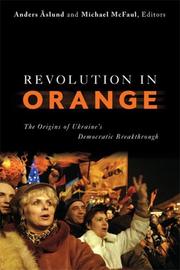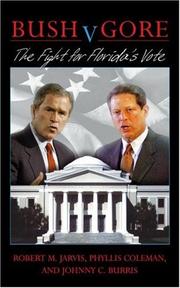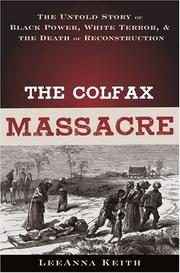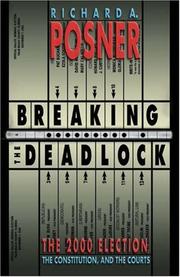| Listing 1 - 8 of 8 |
Sort by
|
Book
ISBN: 1139862111 1139626310 1139699083 1107039681 1107612276 Year: 2014 Publisher: Cambridge : Cambridge University Press,
Abstract | Keywords | Export | Availability | Bookmark
 Loading...
Loading...Choose an application
- Reference Manager
- EndNote
- RefWorks (Direct export to RefWorks)
This book shows that the third wave of democracy has been accompanied by a worldwide wave of opposition-initiated, election-related protests. Such electoral protests result from a failure on the part of incumbent and opposition elites in the developing world to negotiate acceptable terms of electoral conduct, and their consequences for democracy depend on the context in which they occur. Where election boycotts receive international support, they increase the probability of democratic reform, but where support is primarily domestic, there is a higher probability of authoritarian backsliding. Based on an extensive new data set covering nearly thirty years of electoral protest and election-related reform in the developing world, this book explores the causes of different types of electoral protest and their consequences for democracy. Statistical analysis and case studies provide readers with a complete picture of the dynamics surrounding developing world elections, protest, and democratization.
Elections --- Contested elections --- Democracy --- Disputed elections --- Election protests and appeals --- Elections, Contested --- Electoral politics --- Franchise --- Polls --- Political science --- Politics, Practical --- Plebiscite --- Political campaigns --- Representative government and representation --- Law and legislation

ISBN: 9780870032219 0870032216 9780870032226 0870032224 Year: 2006 Publisher: Washington, D.C. Carnegie Endowment for International Peace
Abstract | Keywords | Export | Availability | Bookmark
 Loading...
Loading...Choose an application
- Reference Manager
- EndNote
- RefWorks (Direct export to RefWorks)
"This volume explores the role of former president Kuchma and the oligarchs, societal attitudes, the role of the political opposition and civil society, the importance of the media, and the roles of Russia and the West"--Provided by publisher.
Presidents --- Contested elections --- Présidents --- Elections --- Election --- Contestation --- Ukraine --- Politics and government --- Politique et gouvernement --- History --- PresidentsElectionUkraine --- UkraineHistory --- #SBIB:328H263 --- Instellingen en beleid: andere GOS-staten --- Présidents --- Disputed elections --- Election protests and appeals --- Elections, Contested --- Law and legislation --- Political systems --- anno 2000-2009
Book
ISBN: 9780199363230 Year: 2013 Publisher: Oxford : Oxford University Press,
Abstract | Keywords | Export | Availability | Bookmark
 Loading...
Loading...Choose an application
- Reference Manager
- EndNote
- RefWorks (Direct export to RefWorks)
Electoral misconduct is widespread, but only some countries are punished by international actors for violating democratic norms. Using an original dataset and country case studies, this book explains variation in international norm enforcement.
Election monitoring --- Contested elections --- Democratization --- Comparative government --- Government - General --- Law, Politics & Government --- Political Institutions & Public Administration - General --- Comparative political systems --- Comparative politics --- Government, Comparative --- Political systems, Comparative --- Political science --- Democratic consolidation --- Democratic transition --- New democracies --- Disputed elections --- Election protests and appeals --- Elections, Contested --- Elections --- Election observation --- Monitoring, Election --- Poll watching --- Law and legislation
Book
ISBN: 0199361134 0199991308 9780199991303 9780199991280 0199991286 9780199991297 0199991294 Year: 2013 Publisher: Oxford Oxford University Press
Abstract | Keywords | Export | Availability | Bookmark
 Loading...
Loading...Choose an application
- Reference Manager
- EndNote
- RefWorks (Direct export to RefWorks)
Electoral misconduct is widespread, but only some countries are punished by international actors for violating democratic norms. Using an original dataset and country case studies, this book explains variation in international norm enforcement.
Election monitoring. --- Contested elections. --- Democratization. --- Comparative government. --- Politics and Government. --- Comparative political systems --- Comparative politics --- Government, Comparative --- Political systems, Comparative --- Political science --- Democratic consolidation --- Democratic transition --- New democracies --- Contested elections --- Disputed elections --- Election protests and appeals --- Elections, Contested --- Elections --- Election observation --- Monitoring, Election --- Poll watching --- Law and legislation
Book
ISBN: 1108102603 1108103006 1108103405 1108105017 1316987175 1107189179 1316638812 Year: 2017 Publisher: Cambridge, England : Cambridge University Press,
Abstract | Keywords | Export | Availability | Bookmark
 Loading...
Loading...Choose an application
- Reference Manager
- EndNote
- RefWorks (Direct export to RefWorks)
Settlements to civil conflict, which are notably difficult to secure, sometimes contain clauses enabling the combatant sides to participate as political parties in post-conflict elections. In Electing Peace, Aila M. Matanock presents a theory that explains both the causes and the consequences of these provisions. Matanock draws on new worldwide cross-national data on electoral participation provisions, case studies in Central America, and interviews with representatives of all sides of the conflicts. She shows that electoral participation provisions, non-existent during the Cold War, are now in almost half of all peace agreements. Moreover, she demonstrates that these provisions are associated with an increase in the chance that peace will endure, potentially contributing to a global decline in civil conflict, a result which challenges prevailing pessimism about post-conflict elections. Matanock's theory and evidence also suggest a broader conception of international intervention than currently exists, identifying how these inclusive elections can enable external enforcement mechanisms and provide an alternative to military coercion by peacekeeping troops in many cases.
Elections. --- Contested elections. --- Democratization. --- Conflict management. --- Democracy. --- Self-government --- Political science --- Equality --- Representative government and representation --- Republics --- Conflict control --- Conflict resolution --- Dispute settlement --- Management of conflict --- Managing conflict --- Management --- Negotiation --- Problem solving --- Social conflict --- Crisis management --- Democratic consolidation --- Democratic transition --- New democracies --- Contested elections --- Disputed elections --- Election protests and appeals --- Elections, Contested --- Elections --- Electoral politics --- Franchise --- Polls --- Politics, Practical --- Plebiscite --- Political campaigns --- Law and legislation --- Peace-building. --- Political participation.

ISBN: 9041188657 Year: 2001 Publisher: New York The Hague London Kluwer Law International
Abstract | Keywords | Export | Availability | Bookmark
 Loading...
Loading...Choose an application
- Reference Manager
- EndNote
- RefWorks (Direct export to RefWorks)
Contested elections --- Presidents --- Elections --- Présidents --- Election --- Contestation --- Bush, George W. --- Gore, Albert, --- Trials, litigation, etc. --- -Contested elections --- -Presidents --- -Presidency --- Heads of state --- Executive power --- Disputed elections --- Election protests and appeals --- Elections, Contested --- -Law and legislation --- -Gore, Albert --- -Trials, litigation, etc --- Trials, litigation, etc --- -Election --- -Bush, George W. --- Présidents --- Gore, Al, --- Gore, Albert Arnold, --- Гор, Альберт, --- Гор, Ал, --- Bush, George, --- Bush, Geo, --- Bush, Dzhordzh Uoker, --- Bush, Dzh. U. --- Bush, Dzh. --- Bush, --- Bushi, Qiaozhi W., --- Bush, Zhorzh, --- Arbusto, Jorge W., --- Bush, Xhorxh W., --- Florida --- United States --- 2000 --- Gore, Albert --- Bush, George Walker --- History --- 20th century --- Bush, George Walker, 1946 --- -Trials, litigation, etc. --- Élections --- États-Unis

ISBN: 0199885893 1281163589 9786611163587 0198042388 1435617894 9780198042389 9781435617896 9781281163585 9780195310269 0195310268 9780199885893 Year: 2008 Publisher: Oxford New York Oxford University Press
Abstract | Keywords | Export | Availability | Bookmark
 Loading...
Loading...Choose an application
- Reference Manager
- EndNote
- RefWorks (Direct export to RefWorks)
Introduction: On Bones and Their Markers. Chapter 1: Alabama Fever. Chapter 2: The Philosopher. Chapter 3: The Fall. Chapter 4: Led by a Damned Puppy. Chapter 5: A Town Called Fight. Chapter 6: Carnival of the Animals. Chapter 7: Battle of the Colfax Courthouse. Chapter 8: Voyage of the Ozark. Chapter 9: Getting Away with Murder. Chapter 10: The Legacy of Cruikshank. Notes. Bibliography. Index
Reconstruction (U.S. history, 1865-1877) --- Massacres --- Violence --- Racism --- African Americans --- Contested elections --- Disputed elections --- Election protests and appeals --- Elections, Contested --- Elections --- Afro-Americans --- Black Americans --- Colored people (United States) --- Negroes --- Africans --- Ethnology --- Blacks --- Bias, Racial --- Race bias --- Race prejudice --- Racial bias --- Prejudices --- Anti-racism --- Critical race theory --- Race relations --- Violent behavior --- Social psychology --- Atrocities --- History --- Persecution --- Carpetbag rule (U.S. history, 1865-1877) --- Reconstruction (1865-1877) --- Postwar reconstruction --- Crimes against --- Law and legislation --- Colfax (La.) --- Grant Parish (La.) --- Grant Parish, La. --- Politics and government --- Black people

ISBN: 1282767178 9786612767173 1400824281 0691090734 9781400824281 9780691090733 9781282767171 1400810760 1400817609 Year: 2001 Publisher: Princeton Oxford Princeton University Press
Abstract | Keywords | Export | Availability | Bookmark
 Loading...
Loading...Choose an application
- Reference Manager
- EndNote
- RefWorks (Direct export to RefWorks)
The 2000 Presidential election ended in a collision of history, law, and the courts. It produced a deadlock that dragged out the result for over a month, and consequences--real and imagined--that promise to drag on for years. In the first in-depth study of the election and its litigious aftermath, Judge Posner surveys the history and theory of American electoral law and practice, analyzes which Presidential candidate ''really'' won the popular vote in Florida, surveys the litigation that ensued, evaluates the courts, the lawyers, and the commentators, and ends with a blueprint for reforming our Presidential electoral practices.The book starts with an overview of the electoral process, including its history and guiding theories. It looks next at the Florida election itself, exploring which candidate ''really'' won and whether this is even a meaningful question. The focus then shifts to the complex litigation, both state and federal, provoked by the photo finish. On the basis of the pragmatic jurisprudence that Judge Posner has articulated and defended in his previous writings, this book offers an alternative justification for the Supreme Court's decision in Bush v. Gore while praising the Court for averting the chaotic consequences of an unresolved deadlock.Posner also evaluates the performance of the lawyers who conducted the post-election litigation and of the academics who commented on the unfolding drama. He argues that neither Gore's nor Bush's lawyers blundered seriously, but that the reaction of the legal professoriat to the litigation exposed serious flaws in the academic practice of constitutional law. While rejecting such radical moves as abolishing the Electoral College or creating a national ballot, Posner concludes with a detailed plan of feasible reforms designed to avoid a repetition of the 2000 election fiasco.Lawyers, political scientists, pundits, and politicians are waiting to hear what Judge Posner has to say. But this book is written for and will be welcomed by all who were riveted by the recent crisis of presidential succession.
Contested elections --- Presidents --- Law --- Election --- Political aspects. --- Bush, George W. --- Gore, Albert, --- Droit et politique --- Law and politics --- Recht en politiek --- Internal politics --- Bush, George W. [jr.] --- Gore, Al --- United States --- -Law and politics --- -#KVHA:American Studies --- #KVHA:Politiek; Verenigde Staten --- #KVHA:Geschiedenis; Verenigde Staten --- Presidency --- Heads of state --- Executive power --- Disputed elections --- Election protests and appeals --- Elections, Contested --- Elections --- -Law and legislation --- -Gore, Albert --- Trials, litigation, etc --- Gore, Albert Arnold, --- Гор, Альберт, --- Гор, Ал, --- Bush, George, --- Bush, Geo, --- Bush, Dzhordzh Uoker, --- Bush, Dzh. U. --- Bush, Dzh. --- Bush, --- Bushi, Qiaozhi W., --- Bush, Zhorzh, --- Arbusto, Jorge W., --- Bush, Xhorxh W., --- Trials, litigation, etc. --- #KVHA:American Studies --- Political aspects --- Bush, George Walker --- Gore, Albert --- History --- 20th century --- 2000 --- Gore, Al, --- Bush, George Walker, 1946 --- -Trials, litigation, etc. --- United States of America
| Listing 1 - 8 of 8 |
Sort by
|

 Search
Search Feedback
Feedback About UniCat
About UniCat  Help
Help News
News